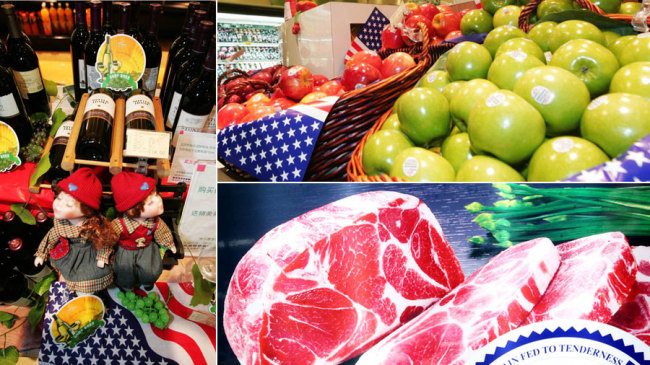


China is rolling out new tariffs on meat, fruit and other products from the United States as retaliation against taxes approved by U.S. President Donald Trump on imported steel and aluminum. [File photo: China Plus]
Poised for retaliation as Washington refuses negotiations
China on Monday hit back at US tariffs by suspending tariff concessions on 128 items of US products, including pork and fruits.
The Customs Tariff Commission of the State Council has decided to impose a tariff of 15 percent on 120 items of products imported from the US including fruits and related products, and a tariff of 25 percent on eight imported items, including pork and related products from the country, read a statement on the website of the Chinese Ministry of Finance.
The statement said the tariffs, effective Monday, aim to offset losses incurred by US Section 232 measures.
Despite worldwide objections, the US decided to impose a 25 percent tariff on steel imports and a 10 percent tariff on aluminum, with tariffs on imports from countries including China.
China's decision also came after the US refused to respond to China's request for trade compensation negotiations with the US through the World Trade Organization (WTO) on March 26, the Chinese Ministry of Commerce (MOFCOM) said on Monday in a statement on its official website.
The decision shows China firmly opposes US unilateralism and protectionism, while maintaining rational behavior and restraint, Dong Yan, a research fellow at the Chinese Academy of Social Sciences' Institute of World Economics and Politics, told the Global Times on Monday.
Exaggerating impact
US President Donald Trump this week will unveil the list of Chinese imports targeted for additional US tariffs, Reuters reported on Monday.
The targets are expected to be "largely high-technology" products, it noted, citing Trump administration officials.
"As Sino-US trade conflicts rise, bilateral trade between the two countries will see several rounds of retaliatory threats. But the threats, which are considered as bargaining chips, may not come true and descend into a trade war," Dong said.
"With much fanfare, the drama is now full-blown. It won't end so easily or be a brief one, otherwise, it would look bad on the Trump administration and the president himself," Tu Xinquan, a professor at the University of International Business and Economics, told the Global Times on Monday.
The US has exaggerated the impact of technology transfer, according to Tu. "The phenomenon may exist in some companies, but it's neither the Chinese government's policy nor promoted by laws," he said, noting the problem is easy to fix.
Making China a future competitor, the US wants to beat China in the high-technology sector, "but in a larger sense, the US hopes to lead with self-serving new rules even if they are not consistent with WTO rules," Dong said.
Zhang Ming, chief economist at Ping An Securities, said in a note that aside from trade, the US is expected to limit Chinese foreign direct investment, talent flow and intellectual property protection. "We need to prepare for the complexity of the game between the two sides," he said.
Cooperation the right choice
"As a WTO member, China has the right to suspend tariff concessions on some US goods, and China hopes that the US would repeal all trade measures that go against WTO rules," the MOFCOM said.
Cooperation is the only right choice for China and the US, and the two largest economies should discuss their concerns in negotiations, it added.
MOFCOM spokesperson Gao Feng stressed on Thursday that "We do not want a trade war… but we definitely are not afraid of a trade war," adding that China will not abandon its legitimate rights and interests and will adopt all necessary measures to firmly defend them.
 Fire brigade in Shanghai holds group wedding
Fire brigade in Shanghai holds group wedding Tourists enjoy ice sculptures in Datan Town, north China
Tourists enjoy ice sculptures in Datan Town, north China Sunset scenery of Dayan Pagoda in Xi'an
Sunset scenery of Dayan Pagoda in Xi'an Tourists have fun at scenic spot in Nanlong Town, NW China
Tourists have fun at scenic spot in Nanlong Town, NW China Harbin attracts tourists by making best use of ice in winter
Harbin attracts tourists by making best use of ice in winter In pics: FIS Alpine Ski Women's World Cup Slalom
In pics: FIS Alpine Ski Women's World Cup Slalom Black-necked cranes rest at reservoir in Lhunzhub County, Lhasa
Black-necked cranes rest at reservoir in Lhunzhub County, Lhasa China's FAST telescope will be available to foreign scientists in April
China's FAST telescope will be available to foreign scientists in April "She power" plays indispensable role in poverty alleviation
"She power" plays indispensable role in poverty alleviation Top 10 world news events of People's Daily in 2020
Top 10 world news events of People's Daily in 2020 Top 10 China news events of People's Daily in 2020
Top 10 China news events of People's Daily in 2020 Top 10 media buzzwords of 2020
Top 10 media buzzwords of 2020 Year-ender:10 major tourism stories of 2020
Year-ender:10 major tourism stories of 2020 No interference in Venezuelan issues
No interference in Venezuelan issues
 Biz prepares for trade spat
Biz prepares for trade spat
 Broadcasting Continent
Broadcasting Continent Australia wins Chinese CEOs as US loses
Australia wins Chinese CEOs as US loses